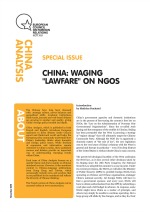China: Waging ‘Lawfare’ on NGOs
China’s new law on NGOs will strengthen Beijing’s ability to supervise the work of foreign NGOs
Chinese government agencies are working towards establishing the first law on NGOs which would cut to the heart of China’s relations with the West, and Europe in particular, according to a new publication by ECFR.
In “China: Waging ‘Lawfare’ on NGOs”, Mathieu Duchâtel, Senior Policy Fellow and Deputy Director of the Asia and China Programme, argues that recent events such as the Arab Spring and the emergence of the Ukraine conflict have persuaded Beijing that the West is pursuing a strategy of “regime change” that will ultimately target the Chinese Communist Party.
The NGO law will allow the Ministry of Public Security to prohibit foreign NGOs from operating on Chinese soil if these organisations endanger China’s national security. The law does fill a legal vacuum that has made operating in China uncertain and unclear but it will involve new bureaucratic obligations and constrains, and considerably strengthen the scope for state supervision of foreign NGOs.
The authors list the main features:
- Foreign NGOs will either have to register a permanent representative office in the country or apply for a temporary activity permit essentially meaning all foreign NGOs will need prior approval from the government in order to be active within Chinese borders.
- Approvals are limited to five year terms at which time the application process must be conducted again. As a result, NGOs will face the threat that their right to operate within Chinese territory may not be renewed.
- Representative offices of foreign NGOs must sign off their annual activity plan with a Chinese supervisory unit– including project implementation and use of funds
The European Council on Foreign Relations does not take collective positions. ECFR publications only represent the views of their individual authors.



